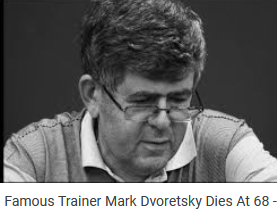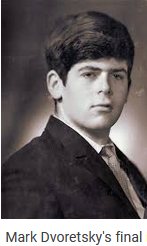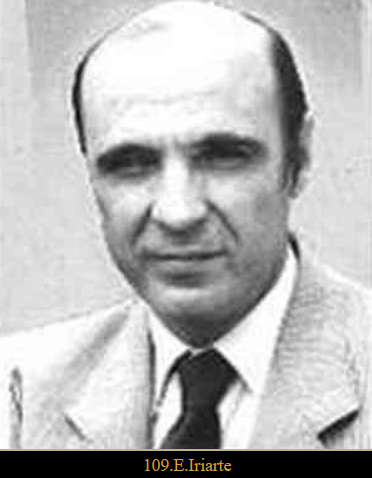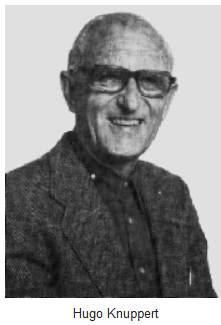In spite of some technical problems such as the noise of pipes covering the voice of the Master and the disappearance of the video of the participants, the course went well in the presence of the regulars.
Here is the Master's report


Mark Dvoretzky is the author of a "endgames manual" which I reviewed ten years ago ( http://www.mjae.com/Villeneuve-Dvoretzky.html ). Despite some flaws, it is an excellent book, unlike its English and German counterparts. However, his real speciality was not in systematic treatises à la Chéron, but in collections of training exercises, meticulously chosen and presented in such a way as to guide the student's research. His best is, in my opinion, "Secrets of Training", of which I have had up to three different editions, in Russian, English and German. Each one made someone happy, once the content was transferred to my computer!
The quality I appreciated most in him was his courage and his reluctance to speak in a vacuum. Read again the lecture of 7 October 2003 where he criticizes the pretentious and calamitous 13th world champion, about two essential games of Lasker.
His conviction on the evolution of our art is clearly summarized (need I say that I share it entirely?): "The tremendous growth of the opening theory has become, from my point of view, a deadly tumor on contemporary Chess, threatening to kill it gradually, without the slightest surgical intervention" (Mr. Dvoretzky in his "Analytical Handbook"). Let us recall also the primordial sentence which I could not help putting in exergue of my 2012 edition: "They try to play the beginning and the middle like world champions, but play the endgames like beginners".
A few other quotes that I exceptionally leave in the language I found them in: they are in a very accessible innegliche basic and, after all, hasn't this site gone global? Uh, don't confuse with mundialist, please!
"Chess is inexhaustible!" is such an overused expression that it has become just another meaningless cliché, and wrongly so!
"Each of us possesses the right to cast doubt upon, and sometimes even refute, the opinion of the greatest authorities, offering in exchange our own handling of events - which of course, may in its turn be refuted".
"I should also like to mention that even the most interesting and convincing discoveries and refutations still give us no grounds to look condescendingly upon an author or commentator of a game. After all, it is enough for us to be right only on occasion (and those occasions are self-selected!) while he must constantly maintain this high analytical level throughout the game and a myriad of variations that remain off-the-board, which is far more difficult.
Another cancer than the one he denounces is this chess-show madness where, under the pressure of the organisers giving in to I don't know what imbecilic fashion, we see players of the world's elite absurdly playing totally drawn endgames (they themselves know it better than anyone) for more than 30 minutes. Show, you say? During the same time, my friends and I will have, in solving-show, examined -- and solved for the most part -- 10 ingenious 2-move mates, jewels of the history of artistic chess. Where do you think we get bored? Let us discard "the outdated, the boring, the superfluous and the banal", as said an author whose tendency in the arrogant 21st century I doubt he would have appreciated.
Mark Dvoretzky's analytical skills were noticed at an early age when, playing a simultaneous game at the age of 16 against the reigning world champion, he was given the responsibility of judging... his own game. His illustrious opponent was convinced by the young master candidate's variations and... admitted defeat!


The big news is that there is no game of the day! More exactly, there is only an extract of... 10 moves of a game, all the rest being an analysis, made more than 40 years after the previous one, extracted from his book of 2008, already quoted: "analytical manual". But what an analysis! As he says himself, there is sometimes more in a game fragment than in a whole tournament!
And, without really moving away from Mark, the rest of the programme. The exercises for today: two perfectly natural positions, as he wishes.
"A bit short, young man", sent me an attentive (and therefore critical) reader, about the grozélo who was summerly slaughtering a "Queen and pawn against Queen". I cannot do better than to communicate to him (and to you) the analysis I made ... 27 years ago (the term "young man" was only a way of speaking) of which I had to modify only one or two iotas and add some complements. But I kept almost the whole text. It was a game of the... last ranked player at the Clermont-Ferrand tournament, who was not going to stay long in these swamps (all relative when you see the level of this tournament). While the winner (Olivier Renet) was the first -- chronologically -- French grandmaster, the Puerto Rico congress of August 1989 having simply... forgotten him. My conclusion at the time spoke of the "fine defensive work of the junior world champion", wasted in one move. One might add, however, that the mistake of moving his King back (instead of aiming at the g1 & h1 squares) made four times, would have been avoided, like that of the summer wrongdoer of a quarter of a century later, if he had thought of simply looking through a compatriot's book, published five years earlier.
A return to Belgrade where there was another study competition, with a theme left open. It was won by the very talented (and very nice) Danish composer who had accompanied us to the zoo, immediately followed by... our guide to the same zoo.
Two "homework" for the next session, a final tribute to Dvo: an etude composed by... a great player and a great composer. And another on the same idea, 60 years apart.
Let's stay in the 60s for a moment, with the problem that made Camil Seneca scream and, four years later, a similar Slovakian provocation.
For training, a choice of 2# that made some stars think. The easiest seems to me the Neill, the most difficult the Knuppert. All gleaned from the website of expert Marjan Kovačević. Obviously, in one country, you have "mat plus", in France, you have "forum minus": other countries, other morals.
An excellent Serbian 3# given this year at the Lithuanian championship. An easy 5# and a difficult 6# by the same author (simple homonym of the author of the 2#). A 2# helpmate with a pinned rook: will it stay pinned? A 3# helpmate that could be called "A Georgian among the Sioux". A 5# helpmate that is easier than it looks, although it was given in a world championship. Finally, a Gamnitzer (long time ago!) for the insomniacs. This time I don't leave the solution. You're back from holiday, aren't you?
Have a good time.
Add a comment